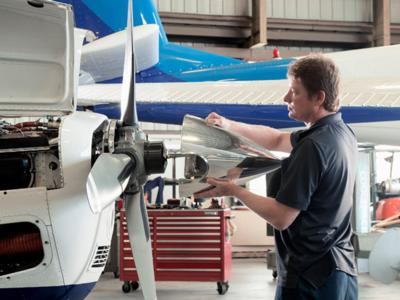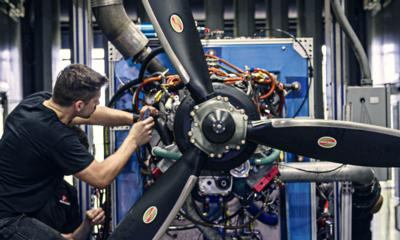Cessna operators got some good news from DeltaHawk at Sun 'n Fun 2025: The brand's new Jet-A engine is on its way for the 172 and 182 families...
The DeltaHawk engine is a refreshing change of pace for the General Aviation industry, boasting a clean-sheet design that burns Jet-A, Sustainable Aviation Fuel, and even Diesel in a simple, robust, inverted-V configuration. The DeltaHawk should be well-suited to the world of flight training, rentals, clubs, and private flight of pretty much every stripe. In their presentation at the Innovation Preview, DeltaHawk CEO Christopher Ruud said the STC was well on the way to "future proof" Cessnas everywhere.

The DeltaHawk engine offers simple single-lever power management, with no need to manually change mixture. Its turbocharged and supercharged design offers much better performance at altitude over naturally aspirated gas engines, all while burning anywhere from 35% to 40% less fuel hour by hour. On top of all that, it cuts out a whole swath of parts compared to legacy powerplants, with a total parts count 40% lower than legacy gas engines. That simplicity and ease of use brings out some nifty features to improve safety and longevity, too. The DeltaHawk has no threat of carbon monoxide when using its cabin heat, with the same true of shock cooling. That’s good news for operators who can't be sure their renters and students follow procedure 100% of the time. It doesn’t take a whole lot of processing power to pull it all off, either: The engine is mechanically controlled, using a small assortment of sensors for operation. In service, the DeltaHawk should only need computerized support for
routine maintenance.

At a larger scale, the prospect of a Cessna STC to start burning Jet-A is great news. For the environmentally conscious, it means a popular training aircraft can now run free of leaded Avgas, a move that also serves to open inroads to nations without the networks to distribute the unpopular and niche fuel. On top of being unleaded, Jet-A has an even greater benefit of being the most affordable of commonplace aviation fuels, almost making it a good enough reason in its own right for those operators in the priciest 100LL markets. Fuel consumption on paper isn’t too far off from what one gets in a Cessna already, as the base model DeltaHawk drinks to the tune of 10.8 gallons an hour at maximum power. Best economy rolls that back a bit, dropping down to 7.3 gallons an hour while putting out 135 horsepower.
The company isn’t just stopping with one-engine-fits-all, offering the DJK180A4 at 180 horsepower, the DHK200A4 at 200 horsepower, and the DHK235A4 at 235 horsepower. In time, DeltaHawk will add a 6-cylinder to the family for even higher output.
 Airborne 06.30.25: US v ADS-B Misuse, Natl STOL Fire, Volocopter Resumes
Airborne 06.30.25: US v ADS-B Misuse, Natl STOL Fire, Volocopter Resumes NTSB Prelim: Piper PA-23
NTSB Prelim: Piper PA-23 ANN FAQ: Submit a News Story!
ANN FAQ: Submit a News Story! Classic Aero-TV: One Mans Vietnam
Classic Aero-TV: One Mans Vietnam Klyde Morris (06.30.25)
Klyde Morris (06.30.25)




